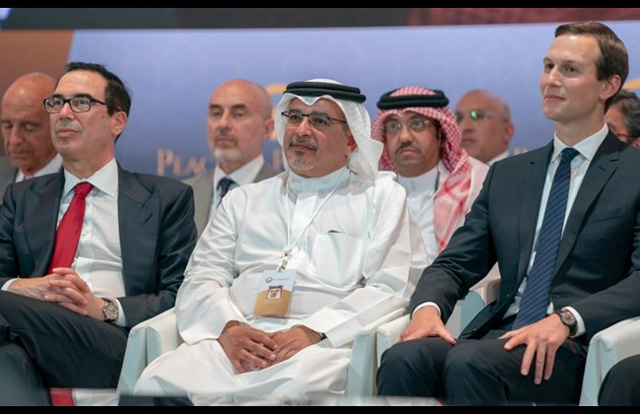
Dubai, United Arab Emirates | AFP | The US-organised economic workshop in Bahrain failed to deliver tangible results over the long-awaited Middle East peace plan but it opened the door for closer Israeli-Gulf ties, analysts say.
Despite this, the normalisation of ties between the Gulf oil monarchies and the Jewish state — staunch US allies who have common concerns over Iran — remains unlikely without progress in resolving the Israeli-Palestinian conflict, they say.
In an unprecedented interview of a senior Gulf official by an Israeli journalist, Bahrain’s Foreign Minister Khalid bin Ahmed Al-Khalifa said on the sidelines of the two-day workshop in Manama that Israel is part of the region’s heritage.
“Israel is part of this heritage of this whole region, historically, so the Jewish people have a place amongst us,” he said in the interview broadcast late Wednesday on Israel’s Channel 13 television.
Sheikh Khalid, a member of the ruling family of the tiny state, called in a separate interview with the Times of Israel for improved relations with Israel, but reiterated his country’s commitment to the Arab Peace Initiative.
Neil Partrick, a London-based Middle East analyst, said the Bahraini foreign minister’s comments “will be the main achievement” of the workshop “as far as the US and Israel are concerned”.
Meanwhile, an Israeli journalist published on her Twitter account an interview with prominent UAE businessman Mohammed Alabbar, who was among a group of business leaders who attended the Bahrain workshop.
“Young people and our children… want to live a life that has hope and optimism and a better future,” Alabbar, chief of real estate giant Emaar Properties, told the journalist when asked what message he wants to send Israeli audiences.
– ‘Clear’ message –
After getting special permission, a handful of Israeli journalists attended the conference in Bahrain, with which their country has no diplomatic relations — like all Arab countries excluding Jordan and Egypt.
“Countries such as Bahrain are more willing to float the carrot of overt engagement, but I think it would be highly premature to expect anything beyond flirtation without meaningful change on the ground,” said Elizabeth Dickinson, senior analyst with the International Crisis Group think-tank.
“The Gulf message is actually somewhat clear in my view: Israel could be a useful, stable ally in a volatile region — but only if there is an agreement with the Palestinians,” she told AFP.
In recent years Israel has been courting Arab nations which do not recognise the Jewish state, and in October Israeli Prime Minister Benjamin Netanyahu held surprise talks in Muscat with the ruler of Oman.
These efforts at rapprochement came as Iran — the arch-foe of Israel and regional rival Saudi Arabia — was bolstering its influence in several Arab countries.
US President Donald Trump’s son-in-law, Jared Kushner, launched the long-awaited Middle East initiative at the conference, which the Palestinian Authority boycotted over fears it sought to buy off the Palestinians and deprive them of an independent state.
– Normalisation ‘some way off’ –
Partrick said it remained unlikely the conference in Bahrain “will lead directly to full diplomatic relations with Israel without the Palestinian leadership backing the final and political ‘deal'”.
He said the “full and proper political normalisation with Israel is still some way off”, especially after the United States recognised Jerusalem as the capital of Israel in 2017.
According to the International Crisis Group, normalisation of ties between Arab countries and Israel still depends on the Israeli-Palestinian conflict.
“If the Bahrain workshop secures a place in future history books, it will be for exposing the limits of Arab-Israeli rapprochement,” it said in a report on Wednesday.
It underlines that “Israel’s overt acceptance in the region requires it to resolve its conflict with the Palestinians,” it said.
The Palestinians have boycotted the US administration since Trump broke with decades of consensus by recognising Jerusalem as Israel’s capital and moving the US embassy from Tel Aviv to the holy city last year.
US officials have hinted the political part of the Middle East plan — which could come out later this year — will not mention the creation of an independent Palestinian state, a goal of decades of US diplomacy.
 The Independent Uganda: You get the Truth we Pay the Price
The Independent Uganda: You get the Truth we Pay the Price



